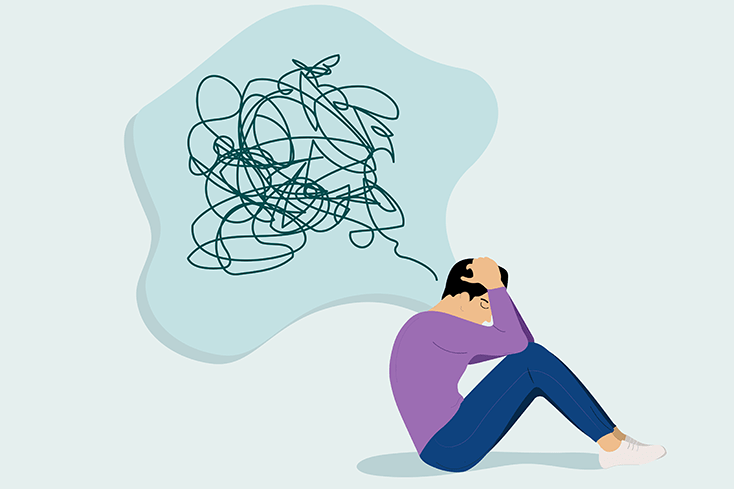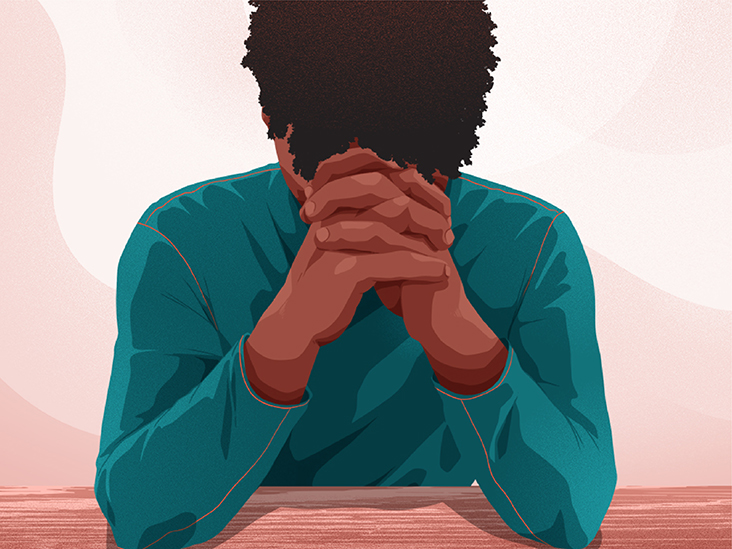Do you have obsessive thoughts that make you feel paranoid? If so, you may be suffering from paranoid OCD. This type of OCD is characterized by intrusive thoughts that make you believe that people are out to get you. You may feel like everyone is talking about you behind your back, or that they are plotting to harm you in some way. If these thoughts are causing significant distress in your life, it is important to seek help. In this blog post, we will discuss all paranoid OCD and how to get the best treatment for it.
Contents
What Is Paranoid OCD?
 Paranoid OCD is a subtype of OCD that is characterized by paranoid thoughts. These thoughts may be about something bad happening to oneself or someone else. People with Paranoid OCD often worry about harm coming to them or their loved ones. They may also worry about being accused of something, or about being watched or followed.
Paranoid OCD is a subtype of OCD that is characterized by paranoid thoughts. These thoughts may be about something bad happening to oneself or someone else. People with Paranoid OCD often worry about harm coming to them or their loved ones. They may also worry about being accused of something, or about being watched or followed.
Paranoid OCD can be very distressing and can interfere with daily life. People with this condition may avoid certain places or activities for fear of harm. They may also have difficulty trusting others and may be overly suspicious of others’ motives.
Sometimes there may be a trigger for the paranoid thoughts, such as a news event or something that happened in the past. In other cases, the thoughts may seem to come out of nowhere. Paranoid OCD is treatable with medication and therapy. If you think you may have this condition, talk to your doctor or mental health professional.
What Are The Symptoms Of Paranoid OCD?

The main symptom of Paranoid OCD is paranoia, which is an unreasonable fear or suspicion of harm. Other symptoms may include:
Suspicious of Other’s Motives
One of the many symptoms of paranoid OCD is that you will be suspicious of the motives of others. If someone does something nice for you, instead of thinking that they are just being kind, you will think that they must have ulterior motives. You may even go so far as to accuse them of trying to harm you in some way. Having this sign, it also becomes difficult to trust people, which can make life very lonely.
Avoiding Situations
Another symptom of paranoid OCD is avoiding situations that you fear will lead to harm. For example, if you are afraid of being attacked, you may avoid going outside or walking in areas where there are not a lot of people around. This can make it hard to do everyday activities and can lead to social isolation. There may be many things that you avoid because of your fear, which can have a big impact on your life.
Intrusive Thoughts
People with paranoid OCD may also have intrusive thoughts about harm coming to them or their loved ones. These thoughts can be very distressing and can make it hard to focus on anything else. You may try to push the thoughts out of your mind, but they keep coming back. The more you try to ignore them, the more obsessed you may become with them.
Constant Worry
Another symptom of paranoid OCD is constant worry. You may worry about something bad happening to you or your loved ones, even when there is no reason to. This can make it hard to relax and can cause a lot of stress.
Resistant of Change
When you have paranoid OCD, you may also be resistant to change. This means that you may not want to try new things or meet new people. You may worry that something bad will happen if you do something different. This can make it hard to grow and learn new things.
Self-doubt
Another sign of paranoid OCD is self-doubt. You may doubt your ability to do things or to make decisions. This can lead to indecision and a lack of confidence. Sometimes there may be many things that you want to do, but you don’t because you doubt your ability to succeed.
These are just some of the many symptoms of paranoid OCD. If you think you may have this condition, it is important to talk to your doctor or mental health professional.
Causes of Paranoid OCD
There are many potential causes of paranoid OCD. Some people develop the condition after experiencing a traumatic event. Others may have a family member with the disorder. Some of these causes are:
Genetics
Genetics is one of the potential causes of paranoid OCD. If you have a family member with the disorder, you may be more likely to develop it yourself. Sometimes there maybe be a specific gene that is linked to the disorder. When it may be genetic, it is often not the only cause. When combined with other factors, it can increase the risk.
Brain Structure
The structure of your brain may also play a role in the development of paranoid OCD. Some studies have shown that people with the disorder have differences in the way their brains are structured. This may be due to different levels of certain chemicals in the brain or changes in how information is processed. It may also be due to a combination of genetic and environmental factors.
Trauma
One of the potential causes of paranoid OCD is trauma. If you have experienced a traumatic event, it may trigger the disorder. This can be any type of trauma, such as abuse, neglect, or a natural disaster. The event may cause you to feel unsafe and to worry about being harmed.
Paranoia
Paranoia is another potential cause of paranoid OCD. If you tend to be paranoid, you may be more likely to develop the disorder. Paranoia is when you have an unreasonable fear or suspicion of harm. You may think that people are out to get you or that they are trying to harm you in some way. This can lead to OCD symptoms, such as intrusive thoughts and avoidance.
Abuse
Another potential cause of paranoid OCD is abuse. If you have been abused, either physically or emotionally, it may trigger the disorder. The abuse may make you feel unsafe and worry about being harmed. This can lead to intrusive thoughts and avoidance.
Neglect
Neglect is another potential cause of paranoid OCD. If you were neglected as a child, it may have an impact on your mental health. You may have experienced emotional or physical neglect. This can lead to feelings of insecurity and anxiety. These feelings can then trigger OCD symptoms, such as intrusive thoughts and avoidance.
Mental Health Disorders
One such factor is mental health disorders. If you have another mental health disorder, such as anxiety or depression, you may be more likely to develop OCD. This is because these disorders can increase your level of anxiety and make you more prone to worrying.
Stressful Life Event
A final potential cause of paranoid OCD is a stressful life event. This can be any type of event that causes stress, such as a divorce, job loss, or the death of a loved one. These events can trigger OCD symptoms in people who are already vulnerable to the disorder.
There are many potential causes of paranoid OCD, but the exact cause is unknown. It is thought to be a combination of genetic and environmental factors. If you have the disorder, it is important to talk to your doctor or mental health professional.
Negative Impacts of Paranoid OCD

There are many negative impacts that Paranoid OCD can have on an individual’s life. These individuals often feel as if they are constantly in danger, and this can lead to a great deal of anxiety and stress. Some of the other impacts are:
Isolation
Isolation is one of the negative impacts of paranoid OCD. When you have the disorder, you may start to isolate yourself from other people. You may avoid social situations and stop seeing your friends and family. This can lead to feelings of loneliness and isolation. Also, there may be many activities that you stop doing, such as going to the movies or out to eat.
Poor Performance at Work or School
Another impact of paranoid OCD is a poor performance at work or school. The anxiety and stress that come with the disorder can make it difficult to concentrate on tasks. This can lead to problems with work or school. There are also many people with the disorder who are unable to work or go to school.
Relationship Problems
Paranoid OCD can also cause relationship problems. The symptoms of the disorder can make it difficult to trust other people. This can lead to arguments and conflict in your relationships. You may also withdraw from your relationships and become isolated.
Impacts on Daily Life
The symptoms of paranoid OCD can also have an impact on your daily life. The disorder can make it difficult to leave your house or to go to work or school. You may also avoid social situations and activities that you used to enjoy. All of this can lead to a decline in your quality of life.
Gives a False Sense of Security
While it may seem like avoiding people and situations will make you feel better, it does the opposite. Paranoid OCD gives you a false sense of security. It makes you think that you are safe from harm if you avoid certain people or situations. But paranoid OCD only leads to more anxiety and fear.
If you have paranoid OCD, it is important to seek treatment. Treatment can help you manage your symptoms and improve your quality of life.
Diagnosis of OCD Tendencies
Diagnosis of OCD tendencies usually falls to a mental health professional, who will likely ask questions about your thoughts, feelings, and behaviors. They may also want to talk to people close to you to get a better sense of how your obsessions and compulsions are impacting your life. A diagnosis of OCD can be made if:
- You have persistent, unwanted thoughts (obsessions) that make you feel anxious or stressed
- You feel the need to perform certain rituals or routines (compulsions) over and over again in an attempt to control or ease your anxiety
- Your obsessions and compulsions take up a lot of time (more than one hour per day)
- Your obsessions and compulsions cause significant distress in your life
- Your obsessions and compulsions interfere with your work, school, or social life
Diagnosis can be done in different ways such as the Yale-Brown Obsessive-Compulsive Scale (Y-BOCS) which is a clinician-administered questionnaire that assesses the severity of OCD symptoms, or the Padua Inventory which is a self-report measure of OCD symptoms.
There are some self-diagnosis methods also that can be used but it is always better to see a professional for an accurate diagnosis. Sometimes there may be many other disorders with similar symptoms so it is important to get a professional opinion. Other times, people with OCD may not want to seek help because they are embarrassed or ashamed of their thoughts and behaviors. If you think you may have OCD, it is important to reach out for help from a mental health professional.
Treating Paranoid OCD

Treating paranoid OCD can be difficult because people with this disorder may not want to admit that their thoughts are irrational. They may also believe that others are out to get them and may not trust their mental health professional. Some of these treatment methods are:
Medications
Medications are one of the most common treatments for OCD. They can help to reduce anxiety and ease symptoms. The most common type of medication used to treat OCD is a selective serotonin reuptake inhibitor (SSRI). SSRIs work by increasing levels of serotonin in the brain, which can help to reduce obsessions and compulsions.
Therapy
Therapy is another common treatment for OCD. It can help you to understand your thoughts and behaviors and learn how to manage them. Cognitive-behavioral therapy (CBT) is the most common type of therapy used to treat OCD. CBT can help you to identify and challenge your negative thoughts, as well as learn new coping and problem-solving skills. There are other types of therapy that can be used to treat OCD, such as exposure and response prevention (ERP), which involves gradually exposing yourself to your triggers and learning how to resist performing your compulsions.
MantraCare is an affordable online therapy provider that offers a variety of treatment options for paranoid OCD. We offer CBT, ERP, and other types of therapy that can help you to manage your symptoms.
Support Groups
Support groups are a great way to meet other people who are dealing with similar issues. They can provide you with support, information, and coping strategies. There are many online and in-person support groups available for people with OCD. There may be some people with paranoid OCD in these groups that can offer helpful insights and support.
Home Treatment
There are also things that you can do at home to help manage your symptoms. One of the most important things is to create a routine and stick to it as much as possible. This can help to reduce anxiety and make your symptoms more manageable. It is also important to get plenty of rest, exercise, and eat a healthy diet. Avoiding alcohol and drugs can also help to reduce symptoms.
There are many different treatment options available for paranoid OCD. It is important to work with a mental health professional to find the best treatment plan for you.
How To Prevent Paranoid OCD?

Preventing Paranoid OCD is not easy, but it is possible. Here are some tips:
Educate Yourself About OCD
You should learn about OCD and how it works. This will help you to understand your thoughts and behaviors and know when they are irrational. There may be many other disorders with similar symptoms so it is important to get a professional opinion.
Create A Routine
Creating a routine can help to reduce anxiety and make your symptoms more manageable. It is also important to get plenty of rest, exercise, and eat a healthy diet. Avoiding alcohol and drugs can also help to reduce symptoms.
Talk To Someone Who Understands
It can be helpful to talk to someone who understands what you are going through. This could be a friend, family member, therapist, or support group. Talking about your thoughts and feelings can help you to feel better and may even reduce your symptoms.
Do Not Ignore Your Symptoms
If you think you may have OCD, it is important to reach out for help from a mental health professional. Ignoring your symptoms will not make them go away and may even make them worse.
Paranoid OCD can be a difficult disorder to deal with, but there are many treatment options available. If you think you may have Paranoid OCD, reach out for help from a mental health professional.
How To Help Someone With Paranoid OCD?

Helping someone with Paranoid OCD can be difficult. Some of these tips to help you get started:
Encourage Professional Help
Encourage the person to seek professional help. This is the best way to get an accurate diagnosis and find the most effective treatment plan. There are also many resources available to help the person cope with their symptoms.
Provide Support
Offer support and understanding. This can be a difficult disorder to deal with and the person may need your support. Be there for them when they need to talk and offer to help out when you can.
Educate Yourself About OCD
It is important to learn about OCD so that you can understand what the person is dealing with. This will also help you to know how to best provide support. There are many resources available online and in books that can help you learn more about the disorder.
Encourage Healthy Coping Mechanisms
Encourage the person to find healthy coping mechanisms such as exercise, relaxation techniques, or journaling. These activities can help to reduce symptoms and make the person feel better.
Be Supportive
Be supportive of the person’s decision to seek treatment and recovery. This includes attending therapy sessions with them, providing transportation, or just being there to listen. There may be many setbacks along the way, but your support can help to make recovery possible.
Encourage A Healthy Lifestyle
Encourage the person to live a healthy lifestyle. This includes getting plenty of rest, exercise, and eating a healthy diet. There are also many other lifestyle changes that can help to reduce symptoms.
If you think someone you know may have Paranoid OCD, reach out to them and offer your support. Helping someone with Paranoid OCD can be difficult, but it is possible. These tips can help you get started.
Conclusion
Paranoid OCD is a serious condition that can be very debilitating. If you think you may have it, please reach out to a mental health professional for help. With treatment, people with Paranoid OCD can learn to manage their symptoms and live happy and productive lives.
If you think you may have Paranoid OCD, please reach out to a mental health professional for help. With treatment, people with Paranoid OCD can learn to manage their symptoms and live happy and productive lives. There are also many online support groups where people with Paranoid OCD can connect with others who understand what they are going through. Remember, you are not alone.
If you’re struggling with mental health problems, know that you’re not alone. MantraCare is here to help you with these mental health disorders. We offer group therapy, self-help strategies, and professional help. Contact us today to learn more about how we can help you! Helping someone with these disorders can be difficult, but it is important to encourage professional treatment, listen and be supportive, and encourage healthy coping mechanisms. MantraCare is here to help you every step of the way. You can also book a therapy or download our free Android or iOS app.


